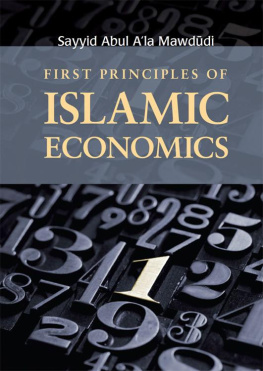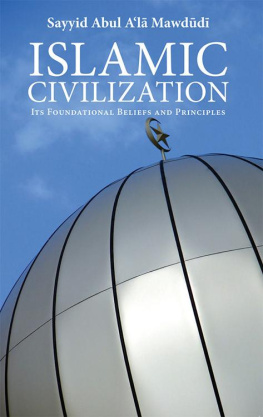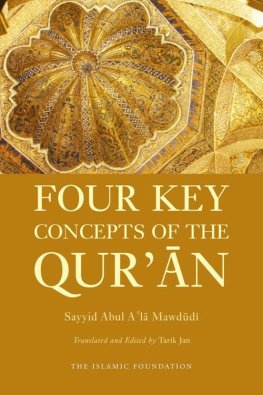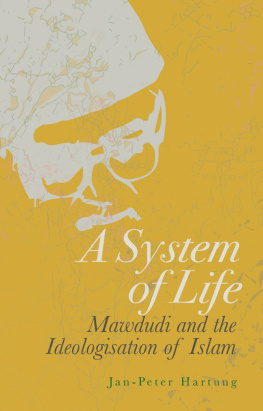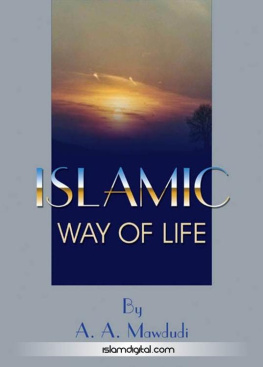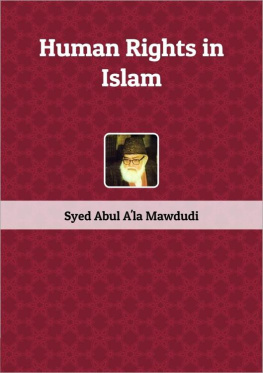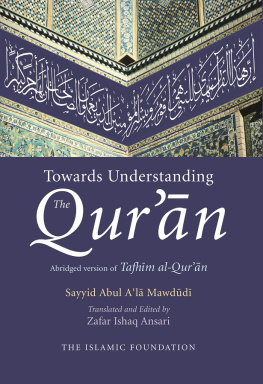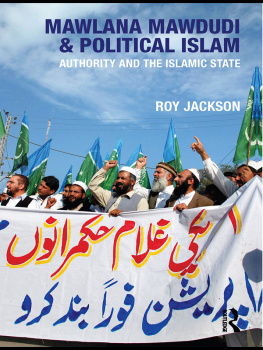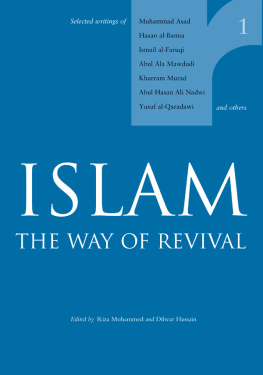Dedicated
to
those noble souls who are tirelessly
engaged in the struggle for a world free
from exploitation.
Sayyid Abul Al Mawdd
FIRST PRINCIPLES OF
ISLAMIC
ECONOMICS
Edited by
Khurshid Ahmad
Translated by
Ahmad Imam Shafaq Hashemi
THE ISLAMIC FOUNDATION
Published by
THE ISLAMIC FOUNDATION,
Markfield Conference Centre,
Ratby Lane, Markfield, Leicestershire
LE67 9SY, United Kingdom
E-mail:
Website: www.islamic-foundation.com
Quran House, PO Box 30611, Nairobi, Kenya
PMB 3193, Kano, Nigeria
Distributed by
KUBE PUBLISHING LTD.
Tel: +44(0)1530 249230, Fax: +44(0)1530 249656
E-mail:
Copyright The Islamic Foundation 2011/1432 AH
All rights reserved. No part of this publication may be
reproduced, stored in a retrieval system, or transmitted
in any form or by any means, electronic, mechanical,
photocopying, recording or otherwise, without the prior
permission of the copyright owner.
Cataloguing-in-Publication Data is available from the British Library
ISBN: 978-0-86037-482-4 casebound
ISBN: 978-0-86037-531-9
Typeset by: N.A.Qaddoura
Cover design by: Nasir Cadir

Contents
PART ONE
THE ISLAMIC CONCEPT OF ECONOMIC WELL-BEING
PART TWO
THE ECONOMIC SYSTEM OF ISLAM: SOME BASIC FEATURES
Transliteration Table
Arabic Consonants
Initial, unexpressed medial and final:
 |  | d |  |  | k |
 | b |  | d h |  |  | l |
 | t |  | r |  |  | m |
 | t h |  | z |  |  |  | n |
 | j |  | s |  | gh |  | h |
 |  | s h |  | f |  | w |
 | k h |  |  | q |  | y |
Vowels, diphthongs, etc.
| Short: |  | a |  | i |  | u |
| Long: |  |  |  |
| Diphthongs: |  | aw |
 | ay |
Foreword
The world today is in the grip of a devastating and protracted economic and financial crisis. What began with the collapse of Lehman Brothers in September 2008 has turned into a global catastrophe, shaking the very foundations of the capitalist system. The dominant paradigm of mainstream economics is also being increasingly challenged. If the fall of the Berlin Wall in November 1989 signalled the end of the seventy years experiment with communism, the crisis that has engulfed the capitalist world has the potential to become an existential threat to capitalism, or at least to its present version of Market Fundamentalism, which represents the high watermark of a politico-economic experiment that has endured for over three centuries a system whose advocates had begun to glibly claim it as the final destiny of mankind. Much seems to have been washed away by the powerful currents of this financial tsunami.
To have some idea of the magnitude and devastating consequences of this unending crisis, it may be worthwhile to reflect for a moment on some aspects of the predicament that has become the fate of humanity today. The leading British economist Roger Bootle describes the current state of the world economy as follows:
From the events of 2007/9, it seems plain that the financial markets have not worked to promote the common weal, and they have caused, rather than absorbed, chaos and instability. [] If the system can produce such wealth-destroying success for some, how can it work for our overall benefit? And if the financial markets are like this, then what about the rest of the market system?
By October 2009, within the first years of the advent of the crisis, the International Monetary Fund reported that the global losses in the banking sector alone were to the tune of $3.6 trillion.
According to a World Bank and IMF Joint Report even though a recovery is underway the impact of the crisis will be lasting and immeasurable. Programmes aimed at poverty reduction around the world will slow down. It is feared that some 20 million people in Sub-Sahara Africa and another 53 million globally will descend into an extreme poverty trap and that those already below the poverty line, some one billion unfortunate human beings, will face a serious erosion of their already miniscule purchasing power. Infant mortality will rise and the availability of safe water, primary education and medical care will nose dive. The conditions of life for the poor of the world will further deteriorate. Even in developed countries, loss of jobs and income are having a heavy toll. Official data show that some 16 million Americans have no jobs and over two million households in the US fear the forced loss of their homes. In the European Union some four million jobs have disappeared, pushing the number of the unemployed to 144 million. While trillions of dollars are being doled out to bailout banks, investment houses, and insurance tycoons, there is little concern for the households that are at the suffering end of this sordid mortgage scandal. The worst part of this obnoxious tale is that the victims, who had no role in driving the world into this crisis, have become the worst sufferers.
Next page
